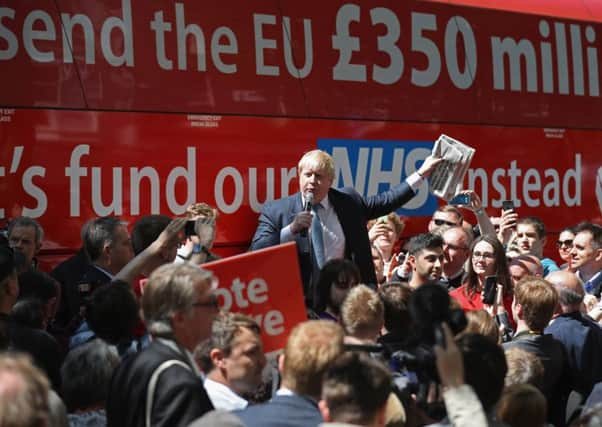Simon Burnett: Equip voters to take informed decisions


Brexit. You may be sick of hearing about it, or maybe you’re scrambling to keep up-to-date about the ongoing political shockwave. As an academic working in the field of information science, two issues related to the referendum are foremost in my mind. The first of these is, given the plethora of information accompanying the debate from campaigners, grass-roots supporters and the media, to what extent did the British public feel they were really in full possession of the facts before they voted, and to what extent were the “facts” themselves massaged to influence the outcome? There’s a sense of déjà vu – many voters expressed similar sentiments shortly after the 2014 Scottish Independence Referendum. Two years on, nothing has changed.
This situation has become much more complex in recent years with the uptake of social media platforms like Twitter and Facebook. These technologies make it easy for political campaigners and members of the public to share information virally about issues like Brexit, but how many of us check the veracity or origin of the content we read and share?
Advertisement
Hide AdAdvertisement
Hide AdThe fact that we’re surrounded and bombarded by content doesn’t appear to make us more informed. Quite the contrary: the myriad of information sources, statistics and personal perspectives may act as a barrier to informed decision-making. We’re seeing the effects of this now, with voters citing the lack of clarity of the information surrounding the debate.
I regularly discuss the concepts of “information” and “knowledge” with students and colleagues. These discussions have become increasingly nuanced and complicated to the point where I’m no longer sure we can say with any certainty what “information” actually is. Caught up in the concept of information are related issues like “truth” and “evidence”. The difficulty is that what we might interpret as factual content might be little more than political spin, or the misappropriation or selective use of information content to sway voter intentions.
There’s been no lack of evidence of this problem throughout the debate and indeed more generally in relation to how we make sense of our current socio-economic environment. Apparently we’d ‘misunderstood’ the Leave Campaign’s vow to spend £350 million per week of EU money on the NHS following Brexit, a view quickly disowned by Nigel Farage with a cursory apology. Sir Andrew Dilnot, chair of the UK Statistics Authority (UKSA), rebuked Leave’s misuse of statistics, specifically singling out the erroneous £350m figure.
We could argue that it is the business of politicians to manipulate data to support their political narratives, but the impact of this deliberate massaging of information for political purposes is extremely serious – particularly in cases like the EU Referendum which is without precedent or recourse. Rightly or wrongly, this type of material is used by potential voters to inform their vote, but it may be doing the exact opposite.
The impact of this is clear: many voters viewed this type of content as factual and, as such, a solid foundation on which to vote. We might argue that anyone who takes the word of a politician as gospel must be asking for trouble, but the impact is that voters couldn’t find the “real” truth about the implications of Brexit. Of course, it’s a matter of perspective whether such a truth actually exists at all.
Perhaps more useful than simply pointing voters to sources of information and allowing them to make their minds up, we could have drawn upon an extensive body of socio-economic and political knowledge in the form of academics and other experts. Shockingly, in an interview with Sky News on 3rd June, Michael Gove said: “I think people in this country have had enough of experts.”
Where, then, does this leave us as future participants in any democratic process in which the facts are manipulated and expert knowledge is discredited? We were encouraged to vote with our hearts, not our minds. We were not being enlightened by information, we’re being put off the scent. Professor of European Politics and Foreign Affairs at King’s College London, Anand Menon argued that the levels of ignorance about the EU were unsurprising, given “the lack of accurate information provided to the public, as well as the mistruths, exaggerations, and scaremongering that have taken place during this campaign”.
So how do we address these highly complex issues? Firstly, we need the skills to evaluate information effectively, and secondly, campaigners must be actively encouraged or obliged to use information in a genuinely meaningful way. To fail to do so leaves us in the unenviable position of failing to understand what we’re actually voting for, and undermines the whole notion of an informed democracy.
• Professor Simon Burnett, iSchool at Robert Gordon University